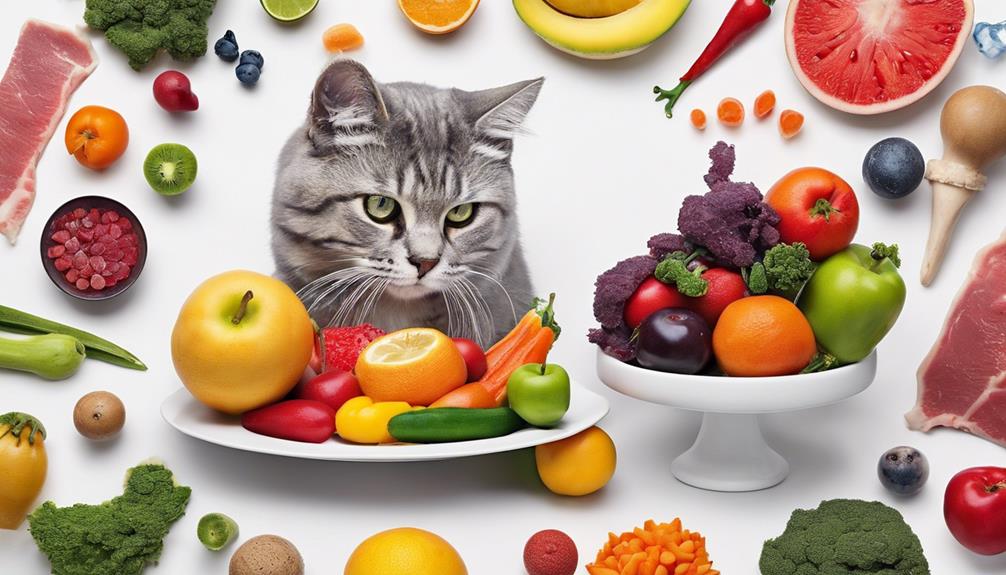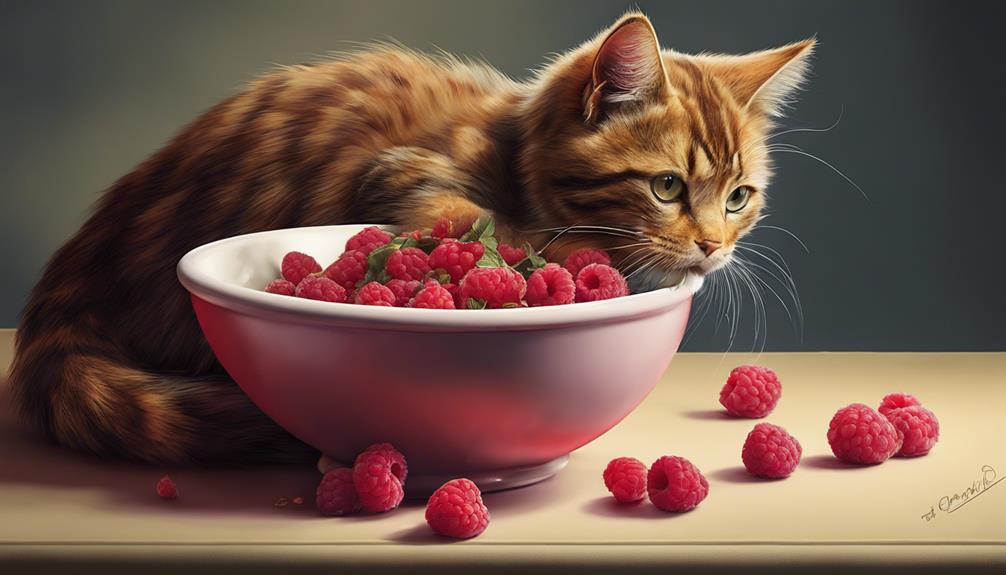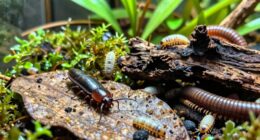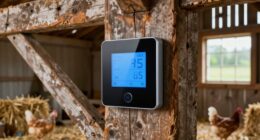Cats can safely eat certain beans, but it is important to exercise caution. Beans offer protein, fiber, vitamins, and minerals. However, cats may experience digestive issues such as gas or an upset stomach. It is crucial to practice moderation when feeding beans; introduce them slowly and observe for any negative reactions. It is advisable to consult a veterinarian before giving beans to your cat, especially if your cat has any health concerns. Stick to cat-friendly options like plain green beans and avoid toxic beans like coffee or canned varieties with excessive salt. Monitor your cat closely for any adverse effects. Make sure to follow our helpful tips for incorporating beans into your cat’s diet.
Key Takeaways
- Cats can eat beans but may experience digestive issues.
- Start with small portions and monitor for adverse reactions.
- Consult a vet before feeding beans, especially for cats with health issues.
- Beans should not be the primary source of nutrition for cats.
- Opt for cat-friendly beans like plain, cooked green beans.
Nutritional Benefits of Beans for Cats
We find that beans offer cats valuable nutritional benefits, including protein, fiber, vitamins, minerals, and antioxidants. Protein is essential for cats' muscle development and overall health, and beans can serve as a supplementary source of this crucial nutrient. While cats primarily require animal protein in their diets, incorporating a moderate amount of plant-based protein from beans can be beneficial.
Fiber found in beans aids in digestion, promoting a healthy gut and preventing constipation in cats. Vitamins and minerals present in beans contribute to supporting various bodily functions in cats, such as maintaining a strong immune system and healthy skin. Additionally, antioxidants in beans help combat free radicals, reducing the risk of certain diseases in cats. When used in combination with high-quality cat foods, beans can provide a well-rounded nutritional boost for our feline companions.
Potential Digestive Issues From Beans
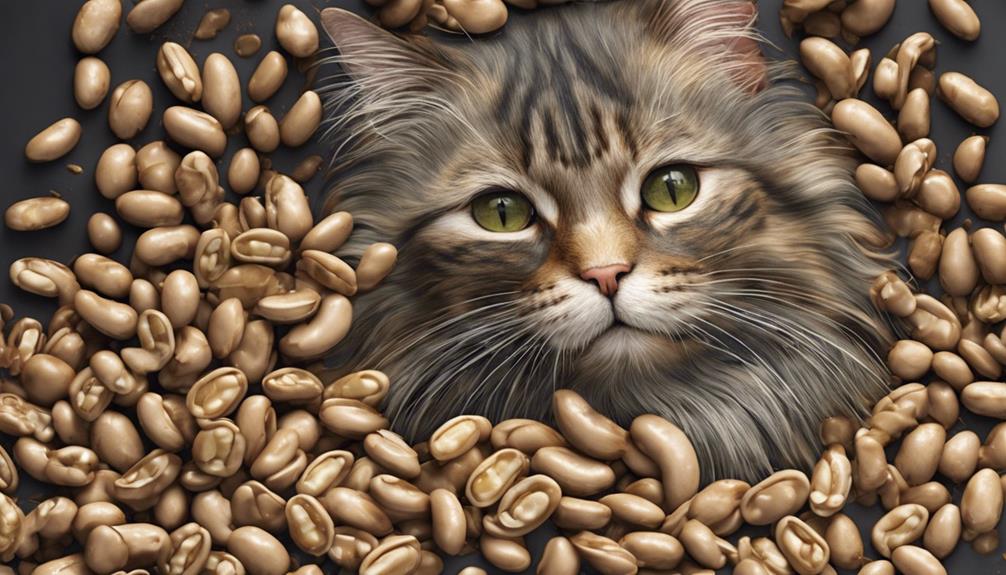
When cats consume beans, they may experience gas, bloating, and an upset stomach due to their difficulty digesting plant-based proteins.
The high fiber content in beans can also lead to diarrhea in cats, causing discomfort and potential health issues.
Introducing beans suddenly into a cat's diet can disrupt their digestive system, emphasizing the importance of monitoring them for any adverse reactions.
Gas and Bloating
Consuming beans can lead to gas and bloating in cats due to their high fiber content, potentially causing digestive discomfort. Cats may exhibit signs of discomfort like abdominal distension and flatulence after indulging in beans. The fiber present in beans can ferment in their intestines, leading to the production of gas and contributing to bloating symptoms. Excessive gas from beans can result in changes in their bowel movements, causing further discomfort. To guarantee the well-being of our feline friends, it is essential to monitor them for any signs of gas, bloating, or digestive issues after feeding them beans. Let's take a look at the table below for a quick summary of the potential gas and bloating effects of beans on cats:
| Effects of Beans on Cats | |
|---|---|
| Gas Production | High |
| Bloating | Likely |
| Digestive Discomfort | Possible |
| Bowel Movement Changes | Potential |
Upset Stomach
Excessive consumption of beans by cats can lead to gastrointestinal distress, including symptoms like vomiting, gas, and diarrhea. Cats' delicate digestive systems can struggle with the high fiber content in beans, potentially causing upset stomach and other digestive issues.
Due to their obligate carnivore nature, cats find it hard to digest beans easily, which increases the risk of experiencing gastrointestinal discomfort. Introducing beans suddenly into a cat's diet can result in upsetting their stomach and causing digestive disturbances.
To prevent these potential issues, it's important to keep a close eye on your cat for any signs of an upset stomach after they consume beans. Monitoring their reactions can help you safeguard their digestive health and overall well-being.
Diarrhea Risk
Feeding beans to cats can potentially result in digestive issues like diarrhea. Cats' sensitive digestive systems may struggle with efficiently processing beans, increasing the risk of diarrhea. The fiber content in beans can sometimes lead to loose stools or diarrhea in cats. Abruptly introducing beans to a cat's diet can cause gastrointestinal upset, including diarrhea. It's important to monitor your feline friend for any signs of diarrhea or digestive discomfort after feeding them beans.
| Diarrhea Risk: | Feeding Beans to Cats: |
|---|---|
| Potential issue | Cats' digestive systems may have trouble digesting beans. |
| Fiber content | Beans' fiber can sometimes cause loose stools or diarrhea in cats. |
| Abrupt introduction | Introducing beans suddenly can lead to gastrointestinal upset, including diarrhea. |
| Monitoring needed | Keep an eye on your cat for any signs of diarrhea or digestive issues after feeding beans. |
Moderation in Feeding Beans to Cats
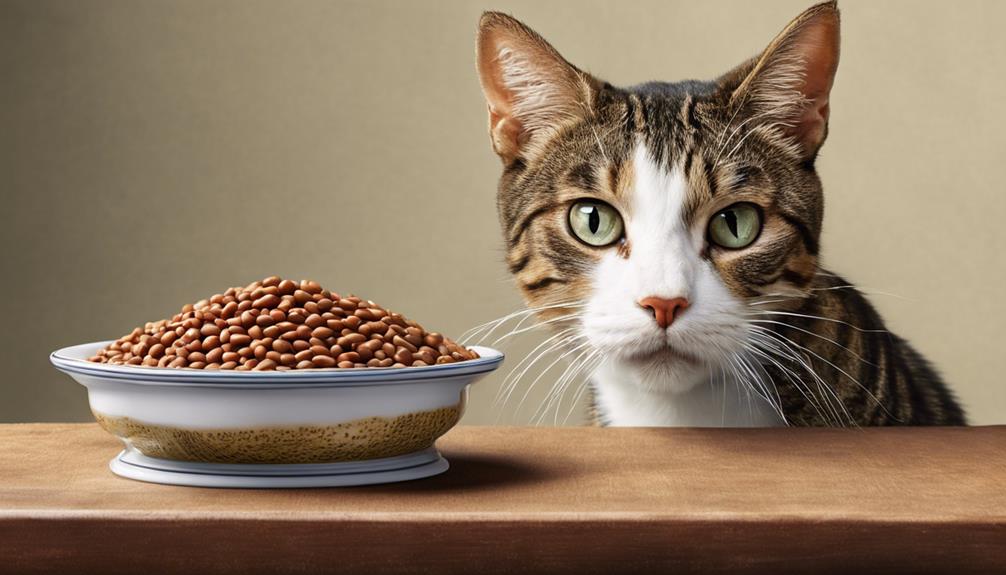
Incorporating beans into a cat's diet should be approached with caution and moderation to prevent potential digestive issues. While cats can enjoy the occasional treat of beans, it's crucial to remember that excessive consumption can lead to gastrointestinal problems such as vomiting and diarrhea. It's imperative to monitor your feline friend closely for any adverse reactions after they've eaten beans, ensuring their well-being and comfort.
When offering beans to your cat, remember that moderation is key. Start with small portions and observe how your cat reacts. If they seem to enjoy beans and don't experience any negative effects, you can continue to offer them in limited quantities. However, if you notice any signs of digestive upset, it's best to discontinue feeding beans and consult with your veterinarian.
Consult a Veterinarian Before Feeding Beans

Before offering your feline friend a taste of beans, it's wise to seek the green light from a veterinarian. Our fluffy companions have unique dietary needs, and consulting a professional can help assess any potential risks or benefits.
Let's prioritize our cat's well-being by ensuring bean consumption aligns with their digestive capabilities and overall health.
Vet Approval Recommended
Consulting a veterinarian prior to introducing beans into a cat's diet is recommended to guarantee the feline's well-being. While beans can be a protein powerhouse for us, cats are obligate carnivores and have different nutritional requirements.
Even though beans can be served to cats in moderation, they shouldn't serve as the primary source of nutrition. A vet's approval is essential before incorporating beans into a cat's diet, especially if the cat has underlying health issues like pancreatitis.
Bean Digestibility for Cats
Cat owners should prioritize their pet's well-being by being aware of the challenges associated with digesting beans due to cats' obligate carnivore nature. Cats have difficulty digesting beans, as their digestive systems are designed for a diet rich in animal protein rather than plant-based foods like beans. Feeding beans to cats can result in digestive issues such as vomiting, gas, and diarrhea, making it important to consult a veterinarian before incorporating beans into their diet.
While plain, cooked beans are the safest option if your cat enjoys them as an occasional treat, it's important to monitor them for any adverse reactions, as beans may not be the most digestible option for feline friends who thrive on a diet primarily composed of high-quality cat food.
Potential Health Risks
Considering the potential health risks associated with feeding beans to cats, it is advisable to seek guidance from a veterinarian before introducing this food into their diet. Cats, being obligate carnivores, have digestive systems that struggle with processing plant-based foods like beans efficiently. To prevent issues such as vomiting, gas, or diarrhea, consulting a professional is essential. Below is a table summarizing the key health risks of feeding beans to cats:
| Health Risks | Description | Prevention |
|---|---|---|
| Vomiting | Beans can cause cats to vomit due to digestion challenges. | Consult a vet before offering beans to your cat. |
| Gas | Cats may experience increased gas when consuming beans. | Opt for plain, cooked beans to minimize this risk. |
| Diarrhea | Digestive issues can lead to diarrhea in cats. | Avoid seasoned or raw beans for a healthier choice. |
Always prioritize your cat's well-being by ensuring their diet aligns with their unique nutritional needs.
Types of Beans Cats Can Safely Eat
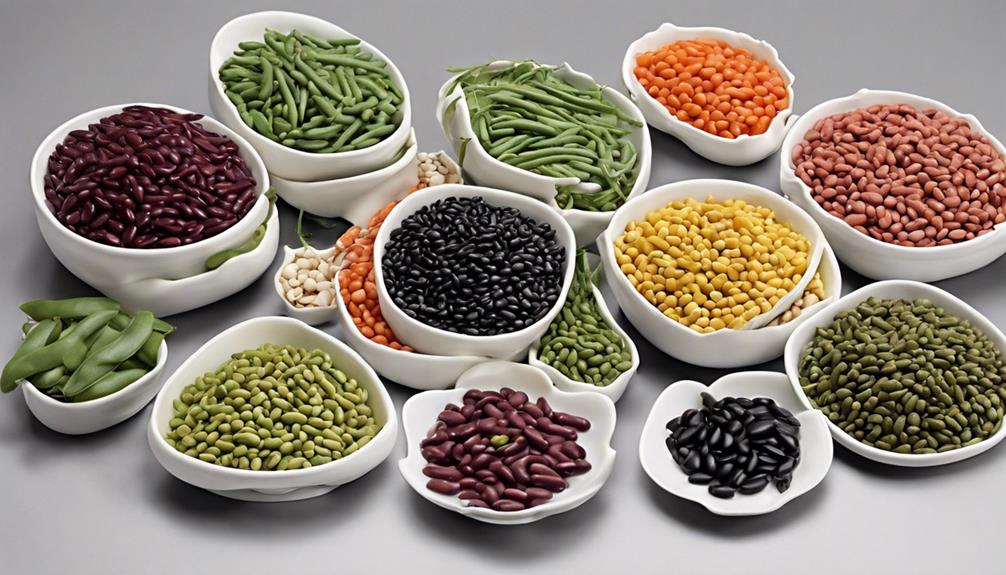
When considering safe beans for cats, it's important to focus on plain, cooked varieties like green beans. These types of beans offer a source of protein for your feline friend without any harmful additives. While green beans are a popular choice, other options like chickpeas and black beans can also be included in your cat's diet in small amounts. These beans provide different nutritional benefits that can complement your cat's regular food. It's vital to avoid beans with added sauces, salt, or seasonings, as these can upset your cat's stomach. Remember, simplicity is paramount when it comes to sharing beans with your cat.
Incorporating safe beans into your cat's diet can add variety and potentially enhance their meals. Just be sure to introduce them gradually and monitor your cat for any digestive issues or adverse reactions. By selecting the right types of beans and serving them plain and cooked, you can treat your cat to a tasty and nutritious snack.
Risks of Certain Beans for Cats
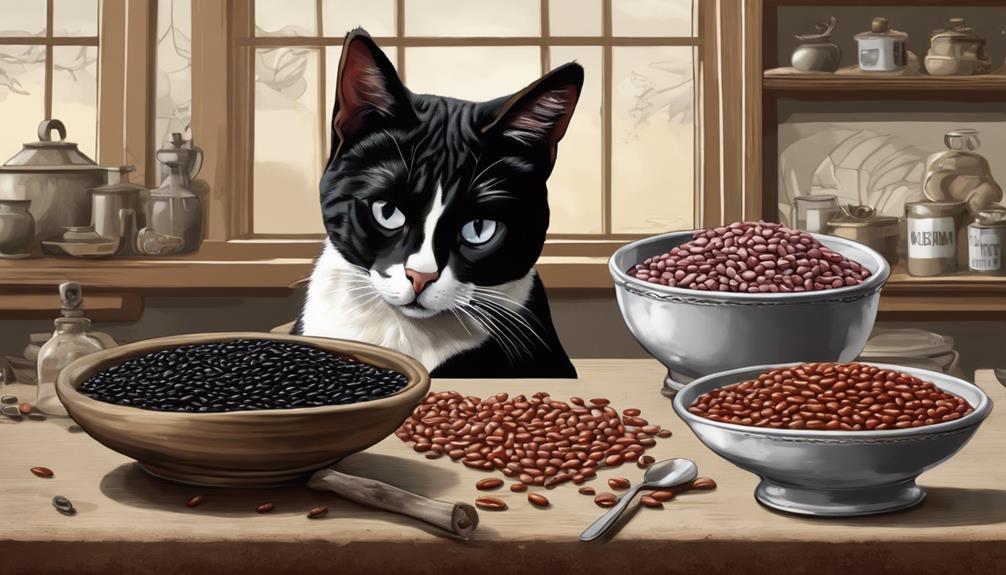
Certain beans pose risks to our feline friends, including potential toxicity, digestive issues, and health concerns.
It's important to be cautious of the types of beans we offer our cats, steering clear of toxic seasonings, added sugars, and harmful additives.
Opting for cat-friendly bean options and moderating their intake can help keep our furry companions safe and healthy.
Toxicity in Certain Beans
Some beans pose risks to cats due to toxic substances and ingredients that can lead to severe health issues. Coffee beans, for example, contain theobromine, which is harmful to cats and can cause symptoms like tremors, seizures, and even death.
Additionally, canned beans may have excessive salt, which can be harmful if consumed in large amounts. It's important to avoid feeding cats jelly beans and baked beans due to added sugar and potentially toxic seasonings like onions or garlic.
Refried beans often contain ingredients like garlic and onion, which can lead to severe health issues such as hemolytic anemia in cats. Being cautious of the ingredients in beans can help prevent toxicity and ensure the well-being of our feline friends.
Digestive Issues Potential
In our experience, cats can develop digestive issues such as vomiting, gas, and diarrhea from consuming specific beans. Beans with high fiber content may lead to digestive discomfort in cats as their digestive systems may struggle to process certain beans efficiently.
For instance, beans like refried beans with added spices can cause digestive upset in cats. It's vital to monitor your feline companions for any adverse reactions after they consume beans known to cause digestive problems.
If you notice any signs of digestive issues after your cat eats beans, it's best to consult your veterinarian for guidance on the appropriate steps to take. Keep a close eye on your cat's well-being to make sure they stay healthy and happy.
Cat-Friendly Bean Options
When selecting beans for your feline companion, prioritize plain, cooked options like green beans over varieties with added seasonings or harmful additives. Remember, cats should avoid beans with added sauces, salt, or pepper. Canned beans can sometimes contain excessive salt, so rinsing them before feeding your cat is a good idea. To guide you in choosing cat-friendly bean options, here is a helpful table:
| Bean Type | Can Cats Eat? | Notes |
|---|---|---|
| Green Beans | Yes | Safe and healthy choice for your cat |
| Jelly Beans | No | Contains added sugars, not suitable |
| Baked Beans | No | Often have toxic seasonings, avoid |
Beans as an Occasional Cat Treat
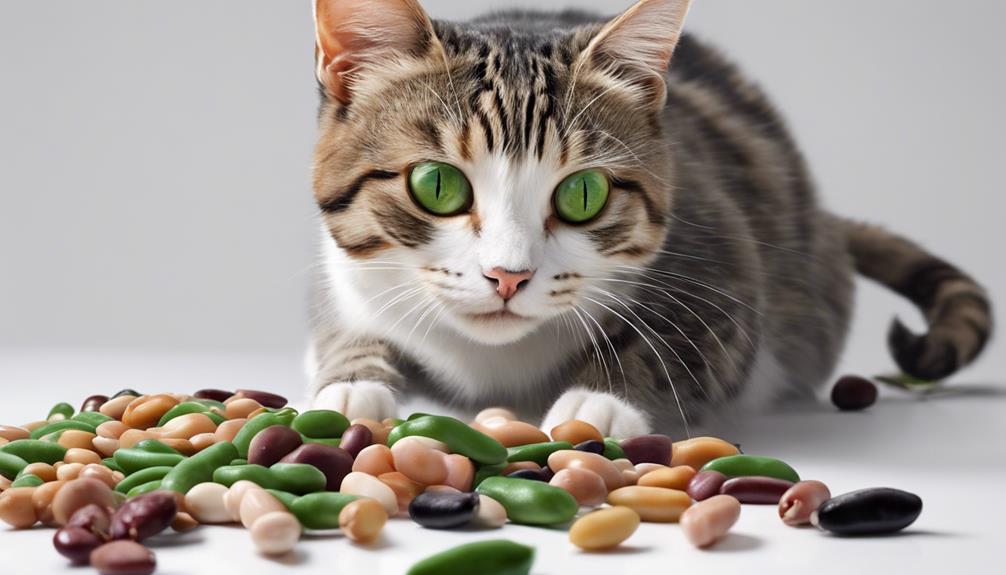
We find that offering cats plain, cooked beans like green beans as an occasional treat is safe due to their high fiber content and low-calorie nature. Here are some essential points to take into account when treating your feline friend to beans:
- Moderation is Key: It's best to offer cats one to three beans as a treat to avoid any digestive issues that might arise from overconsumption.
- Monitor for Reactions: Keep an eye on your cat after introducing beans into their diet to make sure they don't have any adverse reactions.
- Consult the Vet: If your cat has specific health conditions or dietary requirements, it's always a good idea to consult with your veterinarian before adding beans to their diet.
- Supplementary Treat Only: While beans can be a safe occasional treat, they shouldn't replace a balanced feline diet. Make sure your cat's main meals are nutritionally complete to meet their specific dietary needs.
Considerations for Including Beans in Cats Diet
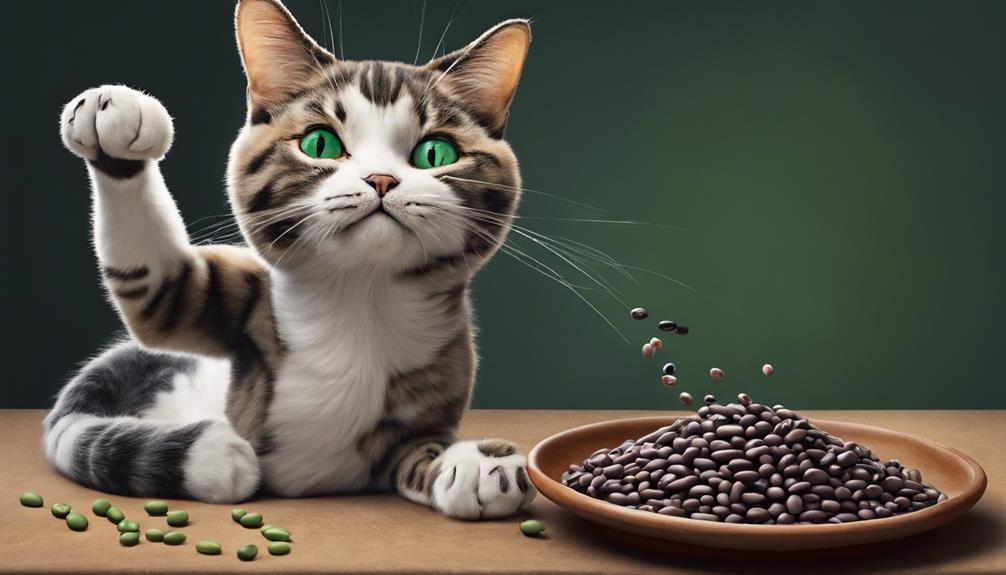
When considering including beans in your cat's diet, it's important to understand the nutritional benefits they offer, the risks associated with feeding beans, and some preparation tips to keep in mind.
Beans can provide protein, fiber, vitamins, minerals, and antioxidants, but they should be a supplemental part of a cat's diet due to their obligate carnivore nature.
Moderation is key to prevent digestive issues, and it's essential to avoid certain types of beans and canned varieties with harmful additives.
Nutritional Benefits of Beans
Taking into account the nutritional needs of cats, incorporating beans into their diet requires careful thought due to their obligate carnivore nature. While beans offer various benefits to humans, cats have specific dietary requirements that make beans less advantageous for them. Here are some key points to ponder:
- Beans are rich in protein, but cats require animal protein for essential amino acids.
- Cats may not benefit as much as humans from the vitamins and minerals in beans.
- Excess minerals in beans can lead to health problems like hyperkalaemia and hypernatremia in cats.
- Cats should avoid beans with high mineral content to prevent urinary tract infections and other issues.
Risks of Feeding Beans
Incorporating beans into a cat's diet requires cautious consideration due to their obligate carnivore nature and unique dietary needs. Cats' digestive systems are optimized for a meat-based diet, making beans potentially problematic. Feeding beans to cats can result in digestive issues such as vomiting, gas, and diarrhea. While plain, cooked beans can be a safe occasional treat, they should not replace essential nutrients from animal proteins. To help illustrate the risks of feeding beans to your feline friend, we've created a table below:
| Risk of Feeding Beans to Cats |
|---|
| Digestive Issues |
| Potential for Vomiting |
| Gas |
| Diarrhea |
| Not a Replacement for Animal Proteins |
Preparation Tips for Beans
To guarantee the safety of your feline friend, meticulously prepare plain, cooked beans as an occasional treat, avoiding any seasonings or additives that could be harmful. When feeding cooked beans to your cat, follow these tips:
- Plain is Best: Opt for plain, unsalted beans to assure your cat's safety.
- Thorough Cooking: Cook the beans thoroughly to make them easier for your cat to digest.
- Moderation is Key: Offer beans as an occasional treat and monitor your cat's reaction.
- Consult Your Vet: If you have any concerns about including beans in your cat's diet, consult your veterinarian for personalized advice.
Cat-Friendly Bean Recipes
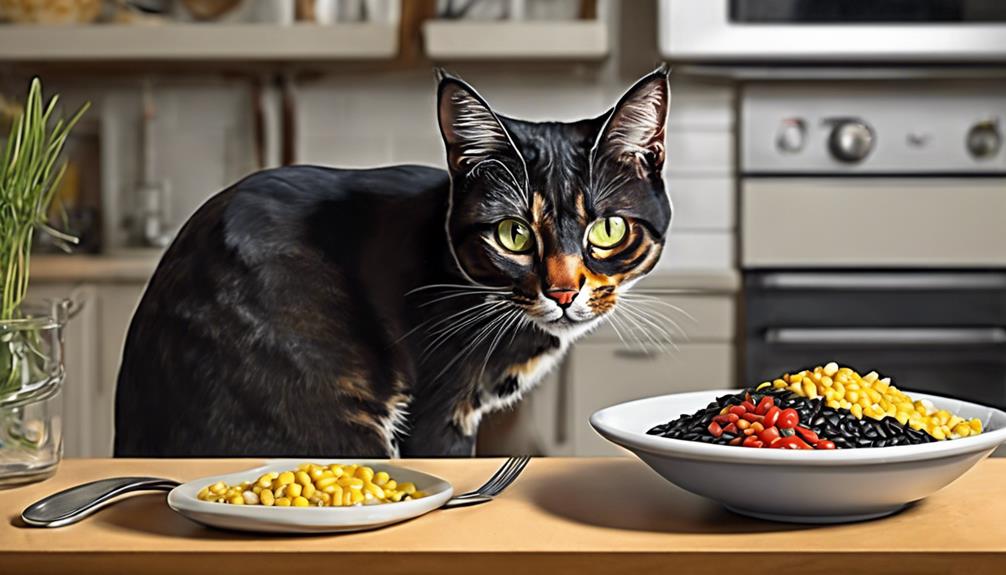
When preparing bean recipes for cats, make sure to exclude any seasonings, sauces, salt, or harmful ingredients to maintain their safety and health.
Cat-friendly bean recipes can be a wholesome addition to your feline friend's diet when prepared thoughtfully. Green beans, for instance, can be a tasty treat for cats when cooked plain and cut into small, manageable pieces.
Another cat-friendly recipe idea is mashed black beans mixed with plain cooked rice for added fiber and nutrients. Remember, moderation is key when introducing beans to your cat's diet to avoid any potential digestive issues.
Consulting with a veterinarian can provide tailored bean recipes that suit your cat's specific dietary requirements. By incorporating beans into your cat's meals in a safe and controlled manner, you can offer them a variety of flavors and textures while ensuring their overall well-being.
Bean Substitutes in Cats Diet
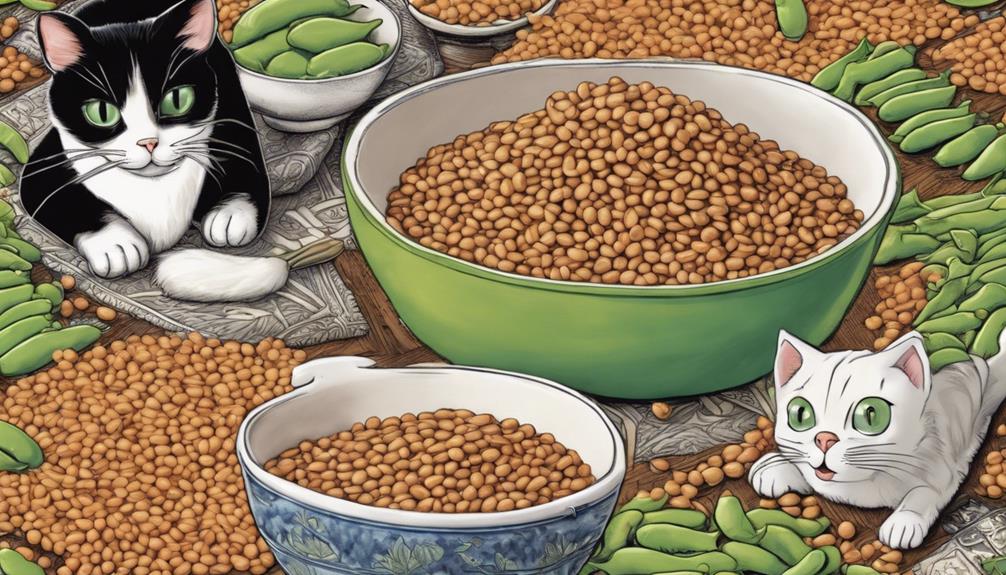
Let's shift our focus to the importance of choosing animal-based proteins over beans as substitutes in a cat's diet. When it comes to meeting the dietary needs of our feline friends, beans fall short compared to high-quality animal proteins. Here's why opting for meat sources is essential in a cat's diet:
- Essential Amino Acids: Cats require specific amino acids found abundantly in meat sources. These essential building blocks are important for their overall health and well-being.
- Rich in Taurine: Animal proteins are full of taurine, an important nutrient for cats that supports heart and eye health. Prioritizing taurine-rich foods over beans ensures your cat gets the necessary nutrition.
- Balanced Diet: Meat-based cat foods offer a balanced nutritional profile tailored to meet a cat's unique dietary requirements effectively. This ensures they receive all the nutrients they need to thrive.
- Premium Quality: Opt for premium cat foods with real meat ingredients to provide your cat with a diet that keeps them healthy and happy without relying on beans.
Monitoring Cats Health With Bean Consumption
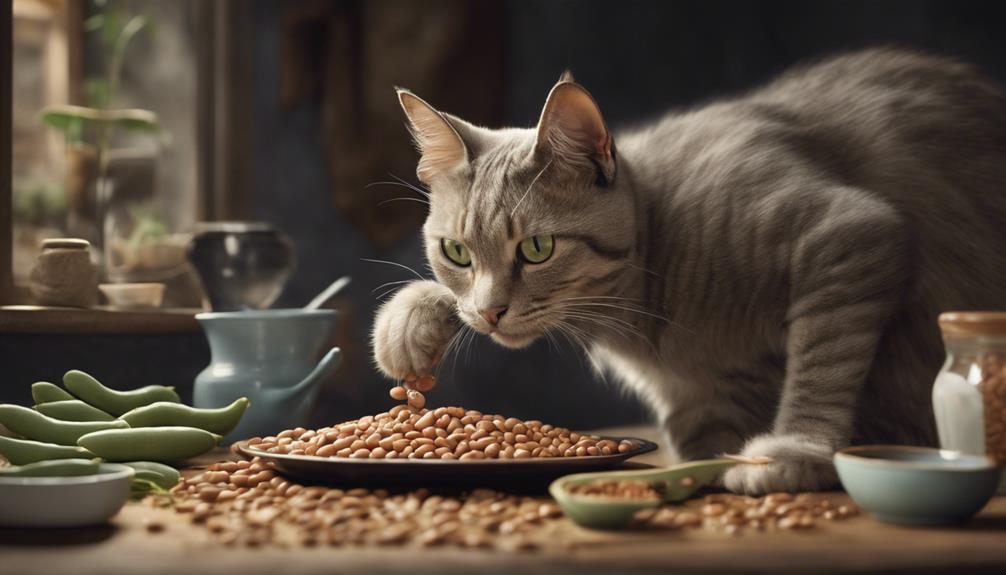
Keeping a close watch on our cats' well-being is crucial when they consume beans, as we should be vigilant for any signs of digestive issues or discomfort. Cats need careful monitoring after eating beans to guarantee they're tolerating this new addition to their diet. Watch out for any vomiting, gas, or diarrhea as these could indicate digestive upset.
Changes in litter box habits may also signal issues with their digestion, so it's important to pay attention to any differences. Additionally, be on the lookout for signs of discomfort or abdominal pain in your cats post-bean consumption. Any changes in appetite or energy levels should be noted and observed.
Introducing Beans to Cats Diet Slowly
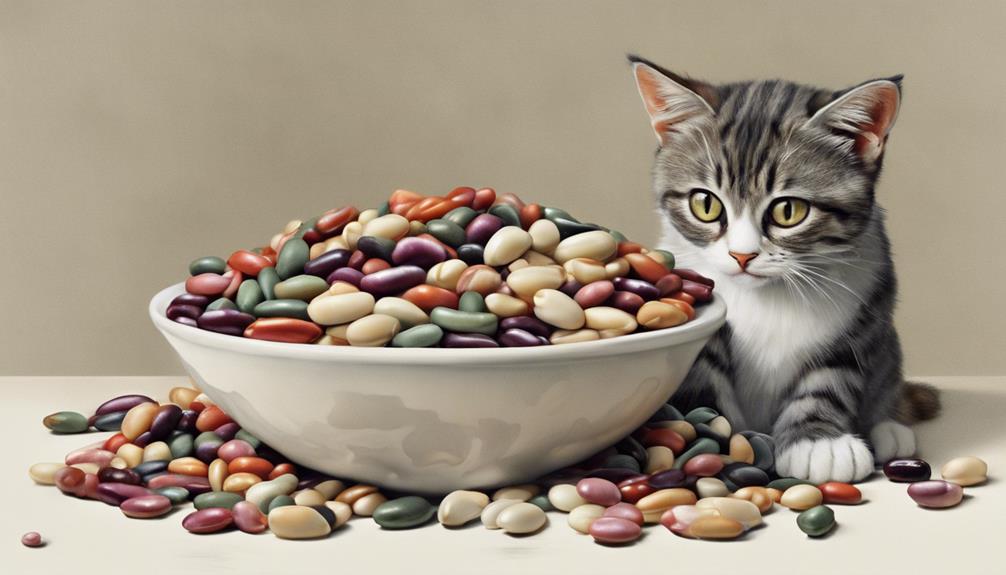
Introducing beans to our cat's diet gradually can help prevent digestive issues and allow their system to adapt to the new food. Here are some key points to keep in mind when introducing beans to your feline friend:
- Preventing Digestive Upsets: Slowly incorporating beans into your cat's meals can reduce the chances of digestive problems like vomiting, gas, or diarrhea.
- Adapting Digestive System: Giving your cat time to adjust to beans allows their digestive system to acclimate to this new addition, promoting better digestion.
- Monitoring for Reactions: Introducing beans slowly enables you to closely monitor your cat for any adverse reactions or potential allergies that may arise.
- Patience is Key: Cats may need time to get used to the taste and texture of beans, so be patient and allow them to gradually accept this new food into their diet.
Signs of Bean Allergy in Cats

Gradually introducing beans to your cat's diet can help detect signs of bean allergy, such as vomiting, diarrhea, lethargy, and skin reactions. Cats are known for their subtle ways of showing discomfort, so it's important to be vigilant for any signs of allergic reactions or gastrointestinal distress after they've consumed beans. Below is a table summarizing the potential signs of bean allergy in cats:
| Allergic Reactions | Gastrointestinal Distress |
|---|---|
| Vomiting | Bloating |
| Diarrhea | Gas |
| Lethargy | |
| Skin Reactions | |
It's vital to be observant as allergic reactions in cats can vary in intensity, ranging from mild symptoms to more severe issues. If your feline friend displays any of these signs after eating beans, consulting a veterinarian is important to determine the best course of action. Monitoring your cat closely and seeking professional advice can help safeguard their well-being and health when incorporating new foods into their diet.
Incorporating Beans in Homemade Cat Food
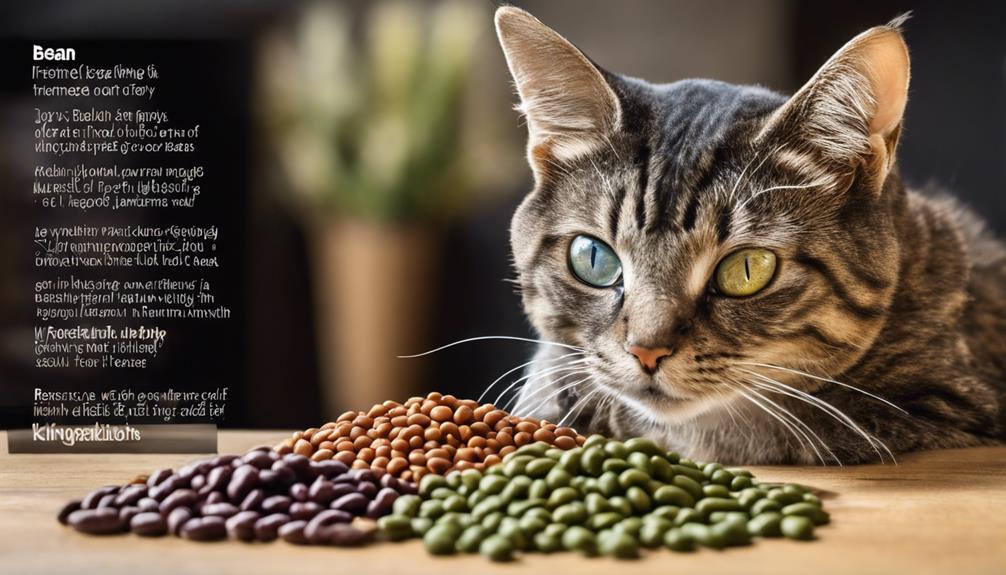
We find that incorporating beans into homemade cat food can offer variety and potential nutritional benefits. When adding beans to your feline friend's diet, consider the following:
- Thorough Cooking: Make sure beans are cooked thoroughly before adding them to homemade cat food. This helps in breaking down the beans for easier digestion by your cat.
- Mashing or Blending: To aid in digestion further, consider mashing or blending the beans before mixing them into the homemade cat food recipe.
- Moderation is Key: Use small amounts of beans in homemade cat food to prevent overwhelming your cat's digestive system. Gradually increase the quantity to observe your cat's tolerance.
- Nutritional Boost: Beans can provide additional fiber, protein, vitamins, and minerals to homemade cat food recipes, enhancing the overall nutritional value of the meal.
Ensuring Balanced Diet Alongside Beans
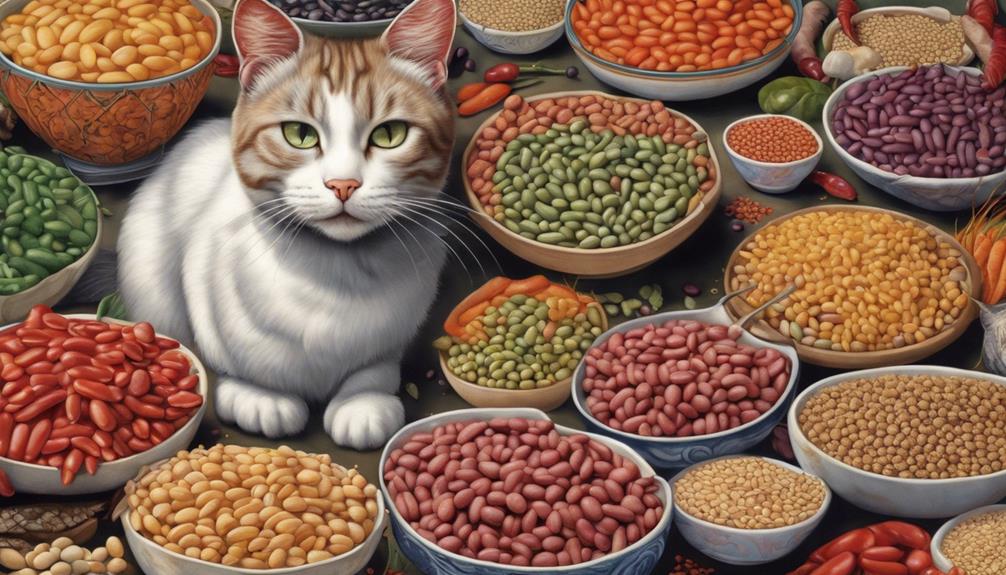
Ensuring a well-rounded diet for your cat alongside incorporating beans requires careful attention to quality meat content in their food. Cats thrive on diets rich in animal protein, making it vital to choose cat foods with high meat content and minimal additives.
When selecting cat foods, prioritize those with clear product descriptions and ingredient lists to guarantee a balanced diet for your feline friend. Opting for human-grade ingredients in cat foods guarantees both quality and sustainability, offering a nutritious alternative to beans as snacks.
While specific beans can serve as occasional treats, it's important to exercise caution, especially with certain varieties that may not agree with your cat's digestive system. By focusing on high-quality cat foods packed with animal protein, you can provide your cat with a well-rounded diet that complements any occasional bean snacks.
Frequently Asked Questions
What Beans Can Cats Eat?
Different beans can be safe for cats in moderation. They can enjoy plain, cooked beans like green beans. Always avoid harmful ingredients and seasonings. Our feline friends are obligate carnivores and should primarily consume animal-based protein.
Why Can't Cats Eat Beans?
Why can't cats eat beans? Well, our feline friends have digestive systems optimized for meat, making beans a tough sell. Introducing beans can lead to tummy troubles like vomiting and diarrhea. Stick to their carnivorous cravings!
Is It OK for My Cat to Eat Baked Beans?
Feeding cats baked beans isn't advisable due to possible seasoning toxicity. Cats may experience digestive issues leading to discomfort. Opt for plain, cooked beans like green beans or chickpeas for feline safety. Consult a vet before introducing new foods.
Can I Give My Cats Canned Green Beans?
We can offer our cats plain canned green beans as an occasional treat in small quantities. Always opt for varieties without added salt or seasonings. Remember to rinse them before serving. Consult a vet to make sure they're suitable for your cat's health.
Are Beans and Pork Safe for Cats to Eat?
Beans and pork safety are a concern for cat owners. While beans are generally safe for cats, pork should be avoided due to the risk of trichinosis. Cats can consume small amounts of beans, but pork can lead to digestive issues and possible food poisoning. Always consult with a vet for proper guidance on cats and pork safety.
Conclusion
To sum up, while beans can offer some nutritional benefits for cats, it's important to introduce them slowly and in moderation. Remember, 'slow and steady wins the race' when it comes to incorporating new foods into your feline friend's diet.
Consulting with a veterinarian before making any changes is always the best course of action to guarantee your cat's health and well-being. By following these guidelines, you can safely feed beans to your cat while maintaining a balanced diet.



